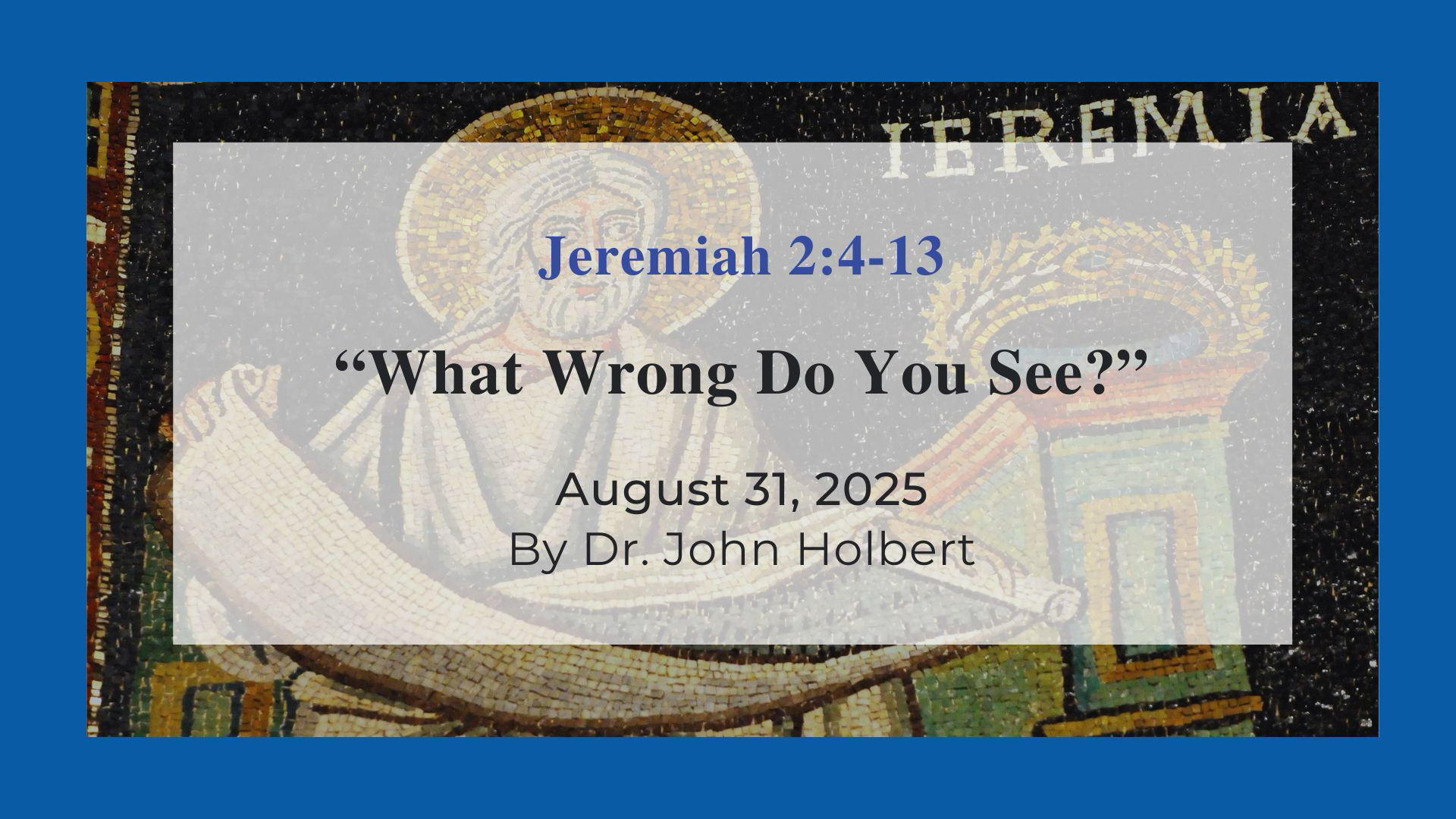What Wrong Do You See? - Reflections on Jeremiah 2:4-13, Pentecost 12, Year C
by John C. Holbert on Sunday, June 8, 2025

After describing his call to prophecy in chapter 1, Jeremiah now turns to some of the reasons that make that prophecy necessary and very difficult. The people of Israel and Judah, who have been in the land of promise for many centuries, and who, according to Jeremiah, have received from YHWH untold gifts, nevertheless have continually turned their backs on that same YHWH. Jeremiah is both furious and mystified, and proceeds to seek answers to his confusion.
The central question is found in Jer.2:4, and Jeremiah imagines that YHWH asks that question: “What evil did your forebears find in me to make them move far away from me?” It is an astonishing way to frame the problem. Is there some “evil” in YHWH that forces the people to run away from their God? Really? Is YHWH somehow evil? How exactly? There seems to be no answer to that question—perhaps because the question is frankly absurd?—so Jeremiah, through YHWH, proceeds to describe, first, where they turned after leaving YHWH, and, second, just how they managed the turn. “They went after emptiness, and became therefore empty” (Jer.2:5b) The word used here—“empty” (Hebrew hebel) is that word that begins the dark book Koheleth, known popularly as Ecclesiastes. “Complete emptiness, all is empty,” that strange speaker begins, and Jeremiah accuses Israel’s chosen people of seeking such complete emptiness, as opposed to the richness of YHWH, and thereby have become empty, insubstantial, themselves. He will later make clearer just what empty things they seek.
How did they become like this? “They did not say, ‘Where is YHWH who brought us up from the land of Egypt, who led us through the wilderness, through a land of dry pits, a land of the deepest darkness, a land where no one goes, where no human lives?’” (Jer.2:6). Those who claim to follow YHWH, but who simply no longer speak aloud the basic claims about that God—most centrally YHWH’s powerful rescue from Egyptian slavery, and subsequent guidance through the dangerous wilderness—are bound to forget or perhaps to distort the memories of YHWH’s care for the people.
After divine rescue and guidance, YHWH “brought you to a land of plenty to eat its good fruits” (Jer.2:7a). But even then, after the good gift of the land of promise, “you made my land, my heritage an abomination” (Jer.2:7b). How? “The priests never said, ‘Where is YHWH?’ Those who studied Torah did not know me. The shepherds rebelled against me. The prophets prophesied by Baal, and rushed after things with no value” (Jer.2:8). YHWH has been rejected and forgotten, because all of society’s basic organs have conspired to neglect God: the priests never speak of YHWH, the students of Torah have no knowledge of YHWH, the “shepherds” (i.e. the rulers) are in rebellion against YHWH, and the prophets, those prophetic colleagues of Jeremiah, pray to Baal, the Canaanite storm god, rather than YHWH. In short, YHWH’s name and memory are clouded and nearly gone from Israel.
As a result, “I (YHWH) bring you to trial again, and I bring your children to trial, too” (Jer.2:9). The prophetic and wisdom literatures of the Hebrew Bible are replete with courtroom language, wherein YHWH is forever dragging a sinning nation into the divine court for judgment. And the prosecuting attorney, YHWH, begins the trial by saying, “Watch! Cross to the coasts of Cyprus and look; go off to Kedar and gaze very carefully; see if anything like this has happened” (Jer.2:10). Cyprus and Kedar represent the western and eastern boundaries of the world Jeremiah knows, so he is attempting to encompass all the places known. And what is he suggesting is the astonishing one thing that Israel has done? “Has any nation changed its gods, though they are no gods? But my people have changed their glory for things useless. Be shocked, skies, at this; be completely desolate!” (Jer.2:11-12). No nation would be foolish enough to exchange its long-trusted God for some new deity, but Israel has done exactly that.
And Jeremiah makes his case against Israel even more explicit. “My people have committed two evils: they have abandoned me, the fountain of living water in order to dig for themselves cisterns, cracked cisterns that can hold no water” (Jer.2:13). The double sin of Israel is that they have first rejected YHWH completely, the very source of living water, and have turned their hearts to other gods who here represent useless and broken cisterns that cannot hold water at all. The divine courtroom is silent in the face of YHWH’s onslaught against the chosen people of Israel. The accusation is the abandonment of YHWH for the heathen gods of Canaan. And the result? In Jer.2:14-18, Jeremiah says that Israel’s defeat and humiliation at the hands of Egypt and Assyria are the direct result of their refusal to trust in YHWH, the God who created them in the first place.
We, who are priests and leaders of congregations now would do well to heed the accusations that YHWH hurls against 7th century Israel. We must never neglect talk of our God, must always be attentive to the memory and activity of that God for us. We need to fill our sermons and teaching with constant reference to what God has done and what God promises to do for the people. In this, I am a purveyor of a return to the Bible, that old and wonderful book, that holds within its pages great wisdom and great hope. Read it and expound upon it whenever you can, for in its pages you will find the God you seek, both that God’s demands and that God’s love for all creation.
